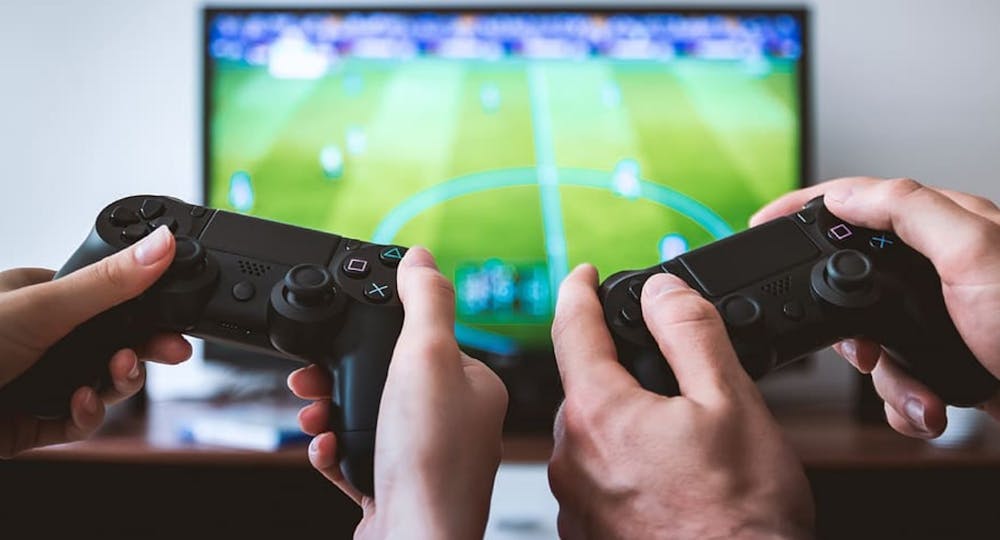As of April 20, all but five state governors have issued stay-at-home orders to slow the spread of the coronavirus. As approximately 95 percent of the population stays indoors, some are turning to video games to pass the time.
Senior Maria Gulino said in an interview with The News-Letter that she has spent more time playing video games since lockdown orders were instituted in Maryland.
“Before coronavirus I played on the weekends,” she said. “Now I play everyday with my roommate. We get work done early so we play a lot more.”
Increased time spent playing video games has mirrored record-breaking sales of video game systems and accessories. According to The NPD Group’s monthly report, U.S. sales of the Nintendo Switch console doubled last month compared to March of last year. Playstation 4 and Xbox One sales have also increased. Gulino said that, uncharacteristically, she bought four new video games in the past month.
Animal Crossing: New Horizons, which debuted just as lockdown orders were being instituted in states across the country, is the second best-selling game in the U.S. so far.
With more people devoting more hours to gaming, it’s worth revisiting the psychological and behavioral effects of playing video games.
Social distancing measures may lead to loneliness. Even before the pandemic, 46 percent of Americans reported feeling sometimes or always alone. Former Surgeon General Vivek Murthy described loneliness as a health threat; a study found an association between loneliness and mortality risk in cancer patients.
Researchers have not determined the effects of social distancing on psychological health, but articles in the New York Times and The Wall Street Journal describe how video games, especially Animal Crossing, have provided relief from isolation.
Freshman James Li believes that video games enable social interaction, even if it’s not in person.
“Video games have made it more convenient for antisocial people to talk to each other,” he said in an interview with The News-Letter.
In addition to the online multiplayer modes that are available in games like the Call of Duty franchise, streaming platforms like YouTube and Twitch have contributed to establishing and maintaining an online community of gamers.
The creation of a gamer community has allowed for solo video gamers to play with others online and helps inexperienced people watch and learn about games.
Scientists have studied the psychological effects of gaming. Researchers from the Johannes Gutenberg University Mainz found that people who played video games “because of the storyline” and for “relaxation” showed only positive psychological effects. They also concluded that positive psychological effects were the strongest compared to negative effects for gamers who played “because of the social relations,” to “stimulate their imagination” and for “curiosity.”
In another study published by the American Psychological Association, the authors noted that certain games such as Mario Party or World of Warcraft amplified social interaction.
The study also found that some role-playing games such as Final Fantasy XIII-2 amplify negative traits such as antisocial behavior. However, the authors noted that more research needs to be done to define video games genres.
Researchers have attempted to answer the question of whether video games are addictive. In the 11th Revision of the International Classification of Diseases, the World Health Organization named “gaming disorder” as a medical condition.
Along those lines, a study determined that eight percent of U.S. youth who played video games exhibited pathological symptoms of addiction such as damage to family, school or psychological functioning. However, Ferguson and colleagues have argued that the effect size in that study was too small to use as evidence of addiction. They also claim that methodological weaknesses in the field as a whole make it difficult to reach definite conclusions.
Freshman Jack Krew does not believe video games are addictive. He played Minecraft and Mario Kart as a kid, and recently he has started to play those games more.
"I don't regret the time I spent playing video games — they are not addictive," he said in an interview with The News-Letter.
Violence is another prevalent issue in the discussion on video games. The Grand Theft Auto and Call of Duty video game series have been criticized for their violent content. Some people argue that such games desensitize players and acclimate them to violence in reality after playing.
However, a group of researchers suggest most users feel irritated if not outright guilty or morally disgusted if a video game urges them to engage in virtual violence that is not contextualized by moral disengagement factors.
Some researchers like Michelle Colder Carras, a former postdoctoral fellow at the Bloomberg School of Public Health, have looked into the therapeutic potential of commercial video games.
During the lockdown, Gulino says that she considers video games as a sort of therapy. According to her, gaming has provided stress relief and a way to pass time.
“It’s fun, and we have nothing else to do, so why not?” she said.





